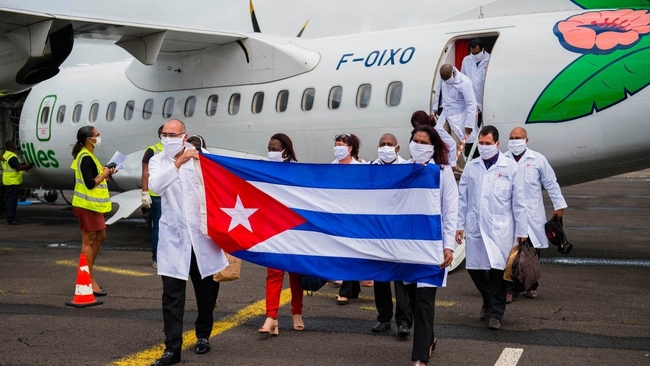Panama abandons Cuban doctors plan under US pressure
France 24 | Thursday, 27 August 2020 | Click here for original article

Panama's government this week abandoned plans to bring in Cuban doctors to help combat the worst coronavirus outbreak in Central America, under pressure from the United States and local unions.
Two weeks ago, President Laurentino Cortizo said his government was "trying to come to an agreement" with Cuba to bring in the team of doctors.
But on Monday, Health Minister Luis Francisco Sucre said: "For now, that decision has been put to one side."
Cuba is renowned for its public health system and expert doctors.
The export of skilled healthcare professionals is Cuba's primary resource generator, and used to be worth $10 billion a year to the impoverished country.
But the prospect of Cuban doctors arriving in a key regional ally triggered alarm bells in Washington.
The US considers the sale of Cuban medical services "forced labor" that serves as a propaganda machine for the island nation's communist regime.
Washington is Panama's main commercial partner and the number one user of the Panama canal. The US has also pledged $4 million in aid and supplied 250 ventilator machines to help fight the coronavirus.
Cortizo "is not afraid but rather terrorized by the idea of US reprisals," Julio Yao, a professor of international law at the University of Panama, told AFP.
"That fear is more than enough to ensure Panama doesn't look for supplies or help from other countries."
Sucre had previously said Panama was assessing how many Cuban doctors would be needed, and also had approached China for help.
- 'Tough position' -
Under the administration of President Donald Trump, Washington's relations with both Cuba and China have significantly deteriorated.
"The United States exerts a determining influence on the aspects of Panama's foreign policy that interest or worry it," said Carlos Guevara-Mann, an international relations professor at Florida State University-Panama.
Trump's national security advisor Robert O'Brien and Mauricio Claver-Carone, the director of the US National Security Council's Western Hemisphere Affairs directorate, traveled to meet Cortizo on August 17.
A former Panamanian diplomat, who spoke to AFP on condition of anonymity, said Claver-Carone is known for his "very tough position on Cuba."
Claver-Carone also expressed concerns about the potential deal before traveling to Panama.
"Obviously they won't say they came for that, but it's certain that the subject was broached," said the former diplomat.
But it wasn't just the US angered by the proposition: Panama's own health unions were quick to point to legal restrictions on foreigners practicing health care in the country, which has recorded 88,000 cases and more than 1,900 deaths from Covid-19 amongst its four million inhabitants.
This week, Sucre revealed that the government had reached an agreement with health unions to "reorganize" the sector and "put together new strategies" to improve health care, thus ending the need for Cuban assistance.
"The internal pressure from Panamanian doctors contributed to diluting the government's enthusiasm, and the visit from the American officials finished it off," said Guevara-Mann.
Since coming to power last year, Cortizo has prioritized relations with Washington over those with Beijing, which were only established in 2017 but had been very active since.
Domingo Moreno, the coordinator of Panama's main health professionals union, told AFP their deal with the government "undoubtedly" contributed to freezing the proposed Cuban mission.
But he added that the "emphatic" opposition from the US was what "changed the president's mind."






